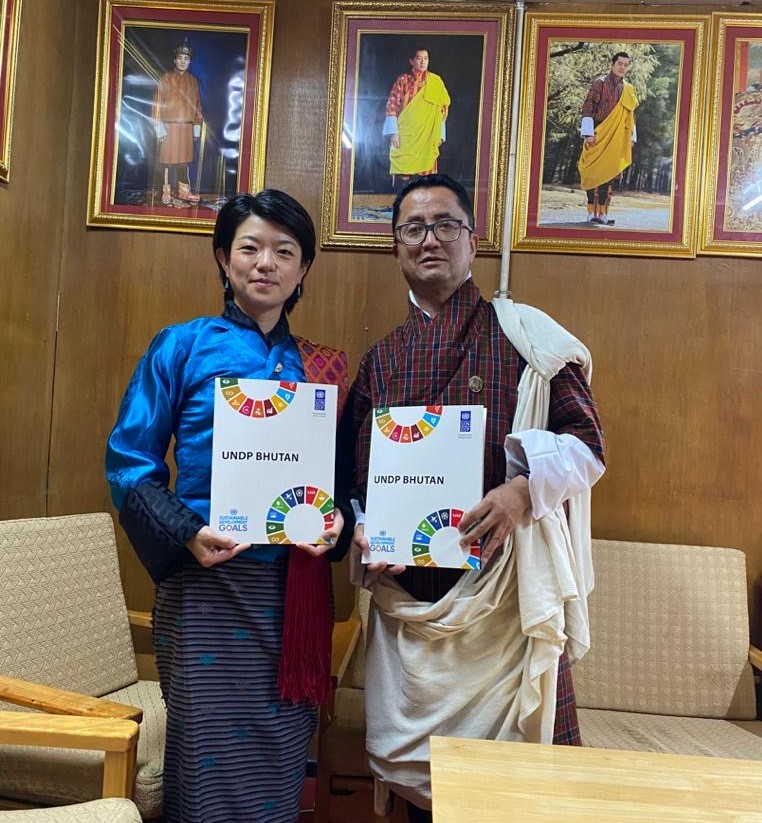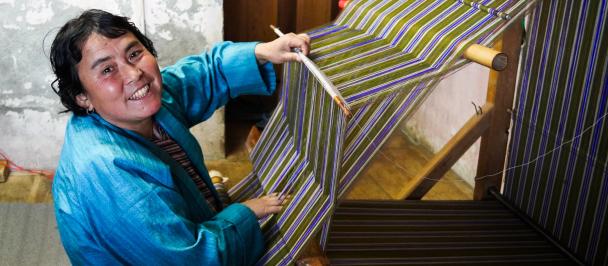UNDP Resident Representative Azusa Kubota and GNHC Secretary Thinley Namgyel at the signing of the partnership agreement
Thimphu, 2July 2020: The Gross National Happiness Commission and UNDP Bhutan signed a partnership agreement today to mark the start of a new UNDP-supported COVID-19 Response and Recovery Project funded by the Government of Japan (GoJ). The Ambassador of Japan to Bhutan, Satoshi Suzuki joined the signing remotely from New Delhi, India where the Embassy of Japan covering Bhutan is based.
The project “Innovation for a Smarter, Greener and More Resilient 21st Century Bhutan” is worth US$ 1,900,800 out of which US$ 1,550,000 is programmable budget. It is part of a global UNDP Project geared towards COVID-19 Response and Recovery and Bhutan is one of the 11 countries in the Asia Pacific, and 29 globally, selected for the funding. The project contributes to UN Bhutan’s joint system response framework to support the national COVID-19 recovery and response.
The project, which will be implemented over the next nine months, will support the Royal Government of Bhutan (RGoB) in its coronavirus response and recovery efforts by strengthening the country’s health systems and addressing socio-economic impacts of the pandemic.
Strengthening the Health Systems
Enhancing access to healthcare services through digital disruption is one of the focus areas under the health systems support. UNDP will partner with the Ministry of Health to introduce innovative solutions, such as mobile cardiotocography, in select hospitals. This will help take healthcare services closer to the expectant mothers living in far-flung corners of the country.
Ensuring safer and more efficient medical waste management is another area of focus under the health systems support. The project will support procurement and establishment of incinerators to manage hazardous waste, capacity development of medical waste handlers and explore partnerships with the private sector.
Addressing Socio-Economic Impacts of COVID-19
Under the socio-economic response suppport package, the project will provide technical support to strengthen the government’s macro-economic framework for policy impact analyses. The Cottage and Small Industries (CSIs) will be also supported through a value chain analysis of essential products and identification of appropriate business solutions.
COVID-19 has impacted the livelihoods of many with the poor and vulnerable households hit the hardest. The project will provide livelihood and upskilling and reskilling opportunities to vulnerable populations. In addition to the 14 vulnerable groups identified by the country’s 2016 Vulnerability Baseline Assessment, the pandemic has impacted CSIs, the self-employed, individuals with limited coping mechanisms, women and youth. Providing timely support to these populations is imperative to ensuring they do not fall back or deeper into poverty.
The support to the socio-economic response will include building a sustainable innovation eco-system with a focus on capacity development of the country’s workforce in line with the demands and opportunities of the 21st century. It will provide technical support and guidance to the establishment of the Bhutan Innovation Hub (BIH) and in identifying a strategic direction for the innovation eco-system, which will contribute towards building a future-ready Bhutan. The support is timely given Bhutan's growing appetite for technology transfer and innovation.
Promoting Clean Energy for Greener Recovery
Renewable energy is another area of support. The country's potential to diversify energy solutions is high and multi-fold with opportunities to create green jobs along various value chains. The project will support the establishment of a 200KW solar farm at Rubesa, Wangdue Phodrang district in partnership with the Department of Renewable Energy and Bhutan Power Corporation Limited. This will help the country “green” the future by promoting synergies with its Nationally Determined Contribution (NDC) target of promoting sustainable, clean renewable energy and maintaining the carbon negative status.
“The support is very timely as this will help RGoB’s rebuilding efforts towards a new normal for which we would like to thank the Government of Japan for the generous contribution made through UNDP. In addition, we thank UNDP Bhutan for the ongoing partnership,” said the GNHC.
UNDP Resident Representative Azusa Kubota thanked GNHC for the critical role it played in coordinating with other government agencies and finalising the proposal in a short period of time, as well as the Japan International Cooperation Agency (JICA) for its support.
“The project is designed to respond to the immediate crisis. At the same time, it has a strong focus on recovery and beyond recovery from the current crisis with future-looking interventions in areas, such as introduction of digital solutions to the health service delivery, diversification of energy sources for greener recovery and support to the innovation eco-system. COVID-19 is a devastating humanitarian and development crisis, but we must turn this crisis into opportunities to think and act differently for our future.” UNDP Resident Representative Azusa Kubota said.
“With support from GNHC and partners, we believe that this project will bring transformational and catalytic changes to the socio-economic fabric of the country, thus contributing to a smarter, greener and more resilient 21st Century Bhutan.”
The project aligns with the UN Secretary General Socio-Economic Framework and the UNDP COVID-19 response and recovery offer 2.0.
The UN Secretary General Socio-Economic Framework sets out the contours of an integrated support package towards the long-term goal of helping countries recover along a sustainable, gender-equal, and carbon-neutral recovery trajectory. UNDP has been chosen as the technical lead for this framework and therefore has the responsibility to ensure it is implemented with quality, speed and scale on the ground.
UNDP’s offer 2.0 is designed to help decision-makers look beyond recovery, towards 2030, making choices and managing complexity and uncertainty in four main areas:
- Governance – building a new social contract;
- Social protection – uprooting inequalities;
- Green economy – rebalancing nature, climate, economy; and
- Digital disruption and innovation – for speed and scale.
Contact information:
Ms. Dechen Wangmo, Communications Analyst, UNDP Bhutan, Mobile: +975 1734 3086, Email: dechen.wangmo@undp.org
****
UNDP partners with people at all levels of society to help build nations that can withstand crisis, and drive and sustain the kind of growth that improves the quality of life for everyone. UNDP Bhutan is part of the 170-country office UNDP network, and offers global perspective and local insight to help empower lives and build resilient nations. UNDP on Twitter | on Facebook | UNDP Bhutan Office

 Locations
Locations

